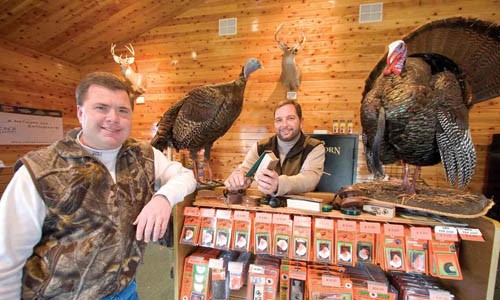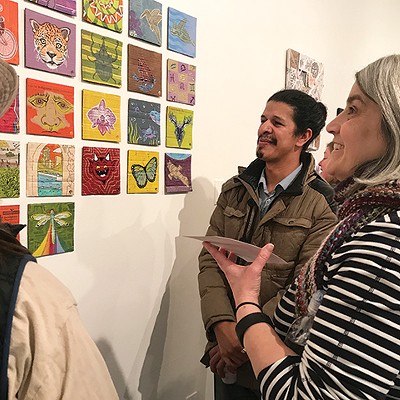An entire flock of turkeys seems to be stuck inside Tom Neumann's office at Penn's Woods Game Calls. Every few minutes there is the grating yelp, or the more melodious gobble, of the wild birds.
"He's working on a turkey-hunting DVD in there," says brother Greg, who co-owns the store.
Located in Export, 20 miles east of Pittsburgh, Penn's Woods is the oldest turkey-call company in the country, the brothers say. With names such as the Lucky Clucker, Ol' Raspy Hen and Little Seducer, Penn's Woods calls have been luring Thanksgiving dinner from local woods since the 1920s.
Hunting today, however, can also be high-tech. Penn's Woods sells tree-mounted, camouflaged digital and video cameras for those days when you can't be out in the woods, as well as the Cellular-Scout, which uses heat and motion sensors to pick up passing game. A Treo phone e-mails the photos right to your PC.
But the art of calling is what keeps turkey-hunting a sport.
"You can go out and just shoot one if you want, but that's not hunting turkeys," says Greg Neumann, who spreads half a dozen different calls on his desk.
"In the spring, you're trying to call in the gobbler -- the male -- because it's mating season," he explains. "In the fall, you're trying to call in the whole flock."
Posing as an alluring hen in the spring involves making any number of sounds -- from the cluck and purr of a bird calmly feeding to the cackle of the creature coming out of a tree. But the most popular call is the yelp: It sounds a lot like fingernails on a blackboard, because that's almost what it is.
Greg Neumann pulls a small hickory rod, the "striker," in small circles across a round piece of slate the size of a beverage coaster. Resonating inside a shallow walnut pot, the sound can set a human's teeth on edge. To a male turkey, though, it must sound like "Hey, baby!"
This Premium Slate Call also has glass on the bottom, for a deeper and softer sound. Another friction call, the Waterproof Wizard, achieves a similar sound by scraping a paint-coated paddle across the open side of a small resonating box.
Penn's Woods' newest friction call is the Twistin' Hen -- two pots with a built-in striker between them. It comes with a strap to hold it to a hunter's thigh, so he can keep his rifle steady while twisting one side of the call.
Diaphragm calls -- thin reeds held inside a soft, latex casing -- are "one of the most difficult calls to master," Neumann says. He puts the call against the roof of his mouth and puts tongue pressure on it while breathing out. For a moment, it seems as if he has exchanged vocal cords with a turkey.
"Your hands are totally free," he says, which allows the hunter to call without moving. "And that's important in turkey hunting, because ... a turkey can actually see 10 times better than humans. You can't get away with any movement at all. With turkeys, you always want to be fully camo'd." So Penn's Woods also makes a camouflage facemask, a camo shoulder bag, and even a camo Rump Rester cushion -- plus blaze-orange arm bands so hunters can see each other between shoots.
"If you're pretty good at using a call, a lot of time out in the woods you can't tell the difference between a turkey and a hunter," Neumann allows. For that reason, he cautions hunters against stalking a sound -- and against shooting without seeing the target.
A second type of call, the locator, makes a gobbler gobble back. The shake gobbler call -- a rubber bellows with a reed inside -- creates the classic gobbling turkey sound. Others are used simply to startle the turkey into sounding, such as the barred owl call, which trills and hoo's, and the crow call.
Which to use? Neumann recommends you use the one that sounds "just the way you've grown up hearing it. Some guys will say slate is a little more forgiving when you're running the call," since it doesn't let the striker slide as much as it can on glass. But the sand-blasted glass call works better in the rain.
"It's actually what the turkey likes -- to his ear," he explains. After all, he adds, "the hens all sound different."
Back to Main Feature



















